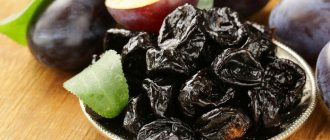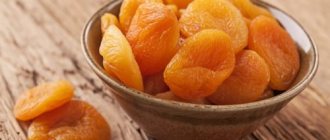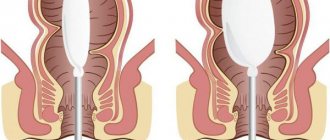Immature intestines in infants often cause problems with bowel movements. Prunes during constipation in a baby are a time-tested way to cope with the problem. But dried plums need to be introduced into the baby’s diet gradually. At what age is it permissible to give prunes and in what form?
Healthy dried fruit
Prunes are the dried fruits of sweet varieties of plums. First, the fruit is blanched in boiling water and then steam-dried. As a result of such processing, the beneficial properties of plums are preserved.
Prunes contain laxatives - sorbitol, phenolic complexes and 7% dietary fiber. Thanks to this, the dried fruit is a good natural laxative with a mild effect.
It’s easy to choose healthy prunes by paying attention to their appearance. Buy matte black berries. Otherwise, you will encounter an unscrupulous manufacturer:
- A dark gray shiny surface indicates that the fruit has been treated with glycerin.
- Black, shiny dried plums look appetizing, but they are often given their marketable appearance by being coated with fat of unknown origin.
- A brown tint indicates that the berry was scalded with boiling water for the purpose of disinfection and longer storage. Such processing negatively affects the taste of dried fruit - it begins to taste bitter.
In prunes with pits, more nutrients are retained, because the top layer is not damaged. Avoid smoked plums - they are smoked using liquid smoke, which is a carcinogen.
It’s easy to check whether the dried fruit you bought is processed or natural: soak the berries for half an hour in cold water. “Correct” prunes will turn white in places when soaked, but processed ones will remain completely black.
How to choose the “right” prunes
Not only the quality of prune compote, but also the health of the child itself may depend on the choice of product. Naturally, it is better to give preference to home-made dried fruits. This is facilitated by a wide range of different devices, equipment and capabilities that significantly speed up the process itself.
When choosing prunes, you should consider the following points:
- “Real” prunes actually have a largely unattractive appearance, but this does not mean that you need to choose bad fruits;
- Dried fruits should be black with intact skin;
- The surface should be matte. Prunes are given shine by treating the fruit with various chemicals or fats, which can cause an allergic reaction or poisoning;
It is better to choose prunes with dense pulp, without plaque (white spots may indicate a spoiled product) or mucus;- If possible, it's worth trying prunes when purchasing. It shouldn't be bitter.
At home, you can check the quality of prunes in a simple way. To do this, you need to immerse several dried fruits in cold water (it is better to take glassware) for half an hour. The correct choice of product will be indicated by the remaining clear liquid and a whitish coating.
Choose prunes with pits - it is believed that such a product retains more nutrients and has a pleasant taste.
Buy dried fruits, not dried plums. To produce the latter, a substance called “liquid smoke” is often used, which gives a characteristic smell and speeds up cooking.
At what months are prunes allowed to be given to children?
Puree dried fruits for constipation are given to babies from the age of six months and later. Prunes should be introduced into complementary foods gradually, starting with a few grams at the tip of a teaspoon. The product is considered non-allergenic, but a reaction often occurs to the substance with which the fruit was treated during preparation. Prunes can also cause excessive loosening of stools, so a child under one year old should not eat more than 5 g (1 teaspoon) of dried fruit.
Infants are given an infusion or decoction of prunes no earlier than three months. Introduce it into your diet carefully, because it is more likely a medicine than a complementary food, and the dose should be medicinal - no more than 5 ml at a time. It is better to give the infusion and decoction using a syringe (without a needle, of course) or a teaspoon. The “medicine” turns out sweet, and the infant drinks it with pleasure.
If a mother consumes dried fruit, the laxative properties of prunes are transmitted to the breastfeeding newborn through milk. But berries must be consumed with caution so as not to cause negative reactions in the baby.
How to replace feedings with complementary foods?
There have been no rigorous studies on this topic, so it cannot be said that one technique is definitely better than another. Many doctors recommend giving complementary foods first, and then breast milk or formula, so that the child does not have time to get enough and is more willing to eat unusual purees.
However, sometimes it is advised to first give breastfeeding or a bottle so that the child is tuned in to eating, and not playing with it, then give complementary foods, then supplement with liquid nutrition. Maybe it will be more convenient for someone to do this at first, and when the child gets used to eating from a spoon, move on to the first option.
Medicines from prunes
Infusion
The healing drink is prepared without boiling, so the beneficial properties of the dried fruit are fully preserved. The infusion is allowed for children from 3 months, starting with one teaspoon (5 ml). As needed, the portion is gradually increased. By the age of one year, it is permissible to give the baby 100-150 ml of drink per day, but not at once. Give your baby a drink 3-4 times a day, 30-50 ml.
The infusion is prepared simply:
- 10 pieces. Rinse the berries with warm water, then scald with boiling water.
- Place the fruit in a pan, jar, or other container with a lid and pour 200 ml of boiling water.
- Close the lid and steep the drink for 12 hours.
It’s easy to notice - the cooking process is not complicated, but lengthy. It is more convenient to make the infusion in the evening, then by morning the delicious medicine will be ready.
Decoction
Despite the name, prunes are not boiled, but brewed. The drink is the most common black dried fruit and the preparation time is minimal.
- 5 pieces. Rinse the prunes several times with warm water.
- Remove seeds from berries.
- Place dried fruits in a saucepan and add 200 ml cold water.
- Bring the berries to a boil and remove the pan from the heat.
- Wait for the broth to cool completely.
The dosage of the decoction is similar to the dosage of the infusion. It is permissible to give the infusion to a child from 3 months, initially 5 ml, gradually increasing the amount. By the age of one year, it is permissible for a baby to drink 120 - 150 ml of decoction.
Compote
Prune compote for constipation is prepared with sugar for babies, so it is recommended for babies no earlier than 6 months. Additionally, you should add dried apricots, raisins, dried apples, and pears to the drink. Compote is cooked according to the same principle as any other:
- 10 pieces. Rinse prunes with warm water.
- Place dried fruits in a saucepan and add 300 ml cold water.
- Bring the drink to a boil and add 50 g of sugar.
- Cook the compote over low heat until the fruit is completely softened - 20-25 minutes.
- Cool the drink.
Compote is introduced into complementary foods in the same way as juices. Initially, the baby is given 5-10 ml and the reaction to the new product is monitored. If no negative effects were noted, the amount of drink is gradually increased to 100-150 ml.
The sugar included in the compote often causes increased gas formation, and therefore children suffering from severe constipation are recommended to use decoction and infusion, otherwise the situation may worsen.
Dried fruits are introduced into baby's complementary foods from 6 months. He is not yet able to chew the berries; they need to be crushed. But there are some nuances here:
- Rinse the berries with warm water and remove the seeds. The quantity depends on the portion needed by the baby. For the first feeding, 2-3 berries are enough.
- Place dried fruits in a container and pour boiling water (150 ml is enough for 2-3 berries). Leave them for 6-7 hours until softened, then drain the water.
- Pour 150 ml of clean water over the berries and boil them for 20-25 minutes.
- Remove the skins from the prunes and puree them using a blender and strainer. You can avoid excessive thickness of the resulting pulp by adding a few tablespoons of water in which the berries were boiled.
It is useful to add prune puree to porridges, replacing sugar with it. It will make the dish both tasty and healthy. The additive is especially good in rice porridge, known for its strong properties, and children eat a dish with prune puree with pleasure.
Read on topic:
Tips for choosing the right prunes
Prunes are made from the Hungarian plum variety. Gone are the days when all berries and fruits were dried naturally, hanging in the shade. Now, to speed up drying, manufacturers first immerse the plums in containers with sonic soda. Many cracks appear on the dense peel of a ripe fruit, and prunes dry 3-4 times faster. To prevent dried fruits from being spoiled by insects and other pests, they are fumigated with sulfur dioxide.
Prunes dried in the traditional way look more unsightly than their chemically treated counterparts. When choosing dried fruit, give preference to black matte specimens with a stone. The delicious shine of dried plums is achieved by polishing them in glycerin or fat of unknown origin, which is unlikely to be healthy for your baby's tummy. In some cases, prunes have a pronounced smoky taste, which is due to the practice of processing plums with liquid smoke.
To prepare drinks, kids need to carefully select the ingredients. If the package says that the prunes are dried in the traditional way without the use of chemical components, take it, you won’t regret it. Food additives indicated on the labels E220 are sulfur dioxide, E524 are caustic soda or caustic soda.
Summary
It is recommended that a child take prunes in the form of infusion and decoction from 3 months, in the form of compote and puree - from 6 months. Carefully monitor the baby’s reaction. In rare cases, dried fruit not only helps with constipation, but also causes diarrhea. However, prunes are considered a mild laxative that rarely causes adverse reactions.
Prunes for constipation in children are a safe folk method for eliminating stool retention. A decoction or puree is prepared from the dried fruit and taken for up to 3 days. The method does not cause negative consequences for the baby's health.
How to quickly introduce new types of products?
There is no need to give your baby several types of new foods at once. He is not fasting in any case, and it is wise to take a few days off (3 days is most often recommended) before the next food.
First, they give a very small amount of food (about half a spoon). If everything is in order, you can gradually increase the portion. Up to how many grams? To a small children's bowl. There is absolutely no need to weigh the portion on a scale. All the same, the child should be given as much as he willingly agrees to eat.
It makes sense to postpone the introduction of a new product for several days if the child is sick or some significant change is expected (for example, a change in formula or place of residence). Then it will be easier to understand the reason for the possible reaction.
Will prunes help a baby with constipation?
Delayed bowel movements have a negative impact on the child’s well-being. Toxins accumulate in the intestines, increasing the risk of food refusal and weight loss, which poses a danger for children in the first months of life. Constipation occurs due to impaired functioning of the intestines or stomach, diseases of the gastrointestinal tract, a violation of the mother's diet, a lack of vitamins in complementary foods, or the presence of toxic substances in food or breast milk.
Prunes, a product that has undergone a drying process and has laxative properties, can help cope with the problem of constipation in children. The fruit contains fiber, pectin, organic acids, minerals, vitamins and tanning components, which help to establish the process of natural cleansing of the intestines from feces.
Doctors recommend taking prunes during breastfeeding for constipation of a newborn mother as decoctions and infusions. The natural product can be eaten in the amount of 1-2 fruits in the morning to monitor the baby’s reaction.
The benefits and harms of prunes
Prunes are a dried fruit made from the fruits of domestic black plums. Only when using the correct selected product for preparing a compote, infusion or decoction can you expect the desired effect for a baby with constipation.
Chemical composition
All the properties that prunes can exhibit when breastfeeding a child suffering from constipation directly depend on its chemical composition. It is due to the following points presented in the table (per 100 g of pulp):
| Chemical composition of prune fruits | |||
| The nutritional value | Vitamins | ||
| Calorie content | 256 kcal | Retinol (vitamin A), Beta-Carotene | 10 mcg, 0.06 mg |
| Squirrels | 2.3 g | Nicotinic acid (vitamin PP) | 1.7 mg |
| Fats | 0.7 g | Group B: Thiamine (B1), Riboflavin (B2) | 0.02 mg, 0.1 mg |
| Carbohydrates | 57.5 g | Niacin | 1.5 mg |
| Plant fiber | 9 g | Ascorbic acid (vitamin C) | 3 mg |
| Water | 25 g | Alpha Tocopherol (Vitamin E) | 1.8 mg |
| Minerals and other substances | |||
| Potassium (K) | 864 mg | Iron (Fe) | 3 mg |
| Calcium (Ca) | 80 mg | Starch and dextrins | 0.6 g |
| Magnesium (Mg) | 102 mg | Mono- and disaccharides | 56.9 g |
| Sodium (Na) | 10 mg | Saturated fatty acids | 0.1 g |
| Phosphorus (P) | 83 mg | Organic acids, polyphenols | Various quantities |
Interestingly, prunes contain almost 1.5 times more potassium than bananas.
Beneficial features
Dried fruits are primarily useful for infants against constipation due to their laxative effect. This is ensured by normalizing intestinal function, which significantly improves the child’s condition.
Prune compote for babies against constipation has the following properties:
- Dietary fiber stimulates peristalsis, facilitating bowel movements;
- The presence of a large number of microelements and vitamins replenish losses, thereby normalizing the functioning of all organ systems;
- Pectin acts as a sorbent, binding and removing toxic substances from the body;
- Ascorbic acid is a natural stimulant of the immune system, increasing the body's resistance to infectious diseases;
- Many organic acids and minerals restore normal functioning of the nervous system, appetite returns;
- Improves the appearance and condition of skin that suffers from prolonged fecal intoxication;
- B vitamins have an effect on the central nervous system, eliminating tearfulness and anxiety;
- All types of exchange are normalized;
- Useful for anemia (decreased amount of hemoglobin and/or red blood cells).
Also, prunes for babies can be useful in relation to the normal development of the genitourinary system, myocardium (heart muscle) and blood vessels.
Cautions
If there is no constipation, you should not often give prune decoction to a baby or consume it in large quantities to a nursing mother. This is due to the fact that the laxative properties of this dried fruit are quite pronounced, so under normal conditions it can cause diarrhea in a child.
You should also limit your consumption of prunes in the following situations:
- Diabetes mellitus (including in women during lactation);
- Overweight child;
- Presence of food or cross allergies (may be detected for the first time);
- The quality of the fruit leaves much to be desired or they are chosen incorrectly;
- The presence of congenital pathology of the kidneys, gallbladder or intestines in the child.
Recipe and instructions for use
Preparing a decoction or puree of prunes for children with constipation is a simple matter; it is important to observe the quantity of ingredients and dosage when consuming. If it is exceeded, it may cause severe loosening of stools and provocation of diarrhea in the baby, causing harm to the body.
Before including prunes in the diet of children to eliminate constipation, you must first consult with a doctor and conduct a diagnosis to determine the cause of stool retention, undergo the necessary studies and tests. In some cases, it may be necessary to prescribe medications; the doctor will help determine the indications and contraindications for prescribing dried fruit in the child’s diet.
Prune compote
The most common way to consume dried fruit for young children is prune compote for babies against constipation. Unlike medications, the decoction helps to gently liquefy stool and has a pleasant taste.
When preparing prune compote for constipation, it is important for children to adhere to the following rules:
- rinse each dried fruit in warm water, thoroughly washing inside and out, remove the seeds;
- soak the berries in warm water for 1 hour and then rinse thoroughly again; in the process of smoking and drying the plums there is a risk of impurities;
- for compote, use clean filtered or special children's water, boiled in an enamel bowl;
- You can store a decoction of prunes for constipation for infants for no longer than 3 days, after which the drink loses its beneficial properties.
Recipe for making compote for a child:
- add washed dried fruits to boiling water at the rate of 200 mg prunes per 500 ml of water;
- for children from 6 months, you can add sugar in the amount of 25-50 mg;
- simmer over low heat for 15-20 minutes;
- let it brew with the lid closed for half an hour.
You can use the compote from birth, in a course of 5-7 days after the pediatrician’s approval:
- 0-6 months – 1 teaspoon of prune decoction three times a day;
- 6-12 months – 1 tablespoon three times a day;
- children 1-3 years old – 20-50 ml;
- 3-5 years – 150-250 ml;
- 6-12 years – 200-500 ml;
- for constipation at 12 years of age and older - 500 ml per day divided into several doses.
The greatest benefit and development of the positive result of loosening stools is observed when children consume compote 20-30 minutes before meals.
Prune puree
For children under 4 months of age, it is not recommended to use dried fruit puree; you should give preference to a decoction of berries or consult a doctor for a recommendation for medicinal products. The gastrointestinal tract is not yet formed to accept complementary foods and sweet prunes, which can aggravate constipation or cause poisoning in the baby.
It is preferable to start introducing prune puree into the diet after 6 months and only after introducing more hypoallergenic vegetables and fruits. After 1 year, to relieve constipation, it is possible to use a salad of plums and figs or a combination of dried fruit with kefir or other fermented milk products.
You can make a puree for constipation from dried fruit yourself or buy a ready-made jar in the store. Many baby food manufacturers include prunes in milk and dairy-free cereals.
Homemade puree recipe for children:
- Pour 4-5 washed prunes into 100 ml of warm boiled water overnight;
- In the morning, peel the berries and grate them on a grater or through a sieve;
- Mix the constipation pulp with a small amount of water and put on low heat;
- bring to a boil and turn off.
The course of treatment for constipation in children is determined by the doctor, but not longer than 2-3 weeks of continuous use to loosen stools, after which you should take a break.
Taking prune puree from 6 months is 1 teaspoon per day, gradually increasing the dose; by 12 months, for constipation, the daily dose can be 80 g.
Reminder for constipation in children.
Treating constipation is a long, stressful and not always rewarding task; a purely medical approach to this problem does not solve most problems. Disturbances in the functional state of the colon or constipation are a fairly common disease in childhood. In the medical literature in recent years it has been called “Irritable Bowel Syndrome.” Constipation occurs in children of all ages, but especially often in younger schoolchildren and children attending preschool institutions. In most cases, this disease does not always bring pain to the child, therefore, clearly insufficient attention is paid to this pathology. Parents find out about this disease in their child quite late, especially if the child is shy and secretive.
Treating constipation is a long, stressful and not always rewarding task; a purely medical approach to this problem does not solve most problems. Children with chronic constipation become lethargic, irritable, fearful, and their performance at school quickly declines. Many children, out of fear of painful sensations during the act of defecation, become isolated and independently suppress natural urges, thereby aggravating the course of the disease, a so-called “vicious circle” is formed.
Thus, chronic functional constipation in children attending preschool institutions and school acquires social significance; Therefore, pediatricians almost always rely on parents for help and support in the rehabilitation of children. Only parental care and a friendly environment help to obtain lasting results.
Constipation is the abnormal functioning of the colon, which is manifested by rare bowel movements in a child (less than once every two days) or their complete absence for a long time (which is very common), difficult and painful bowel movements, a small amount of stool (dry and hard). ), lack of physiological feeling of complete bowel movement.
The human colon is the site of fecal mass formation and is approximately U-shaped. The length of the entire colon in a child over 3 years old is on average 1-1.5 meters. Feces are formed from undigested and undigested food residues. This occurs through partial dehydration and various types of peristaltic movements of the intestine, forming and moving feces towards the exit. A significant part of the feces consists of a huge number of microbial bodies. According to microbiologists, in 1 gram of feces of a healthy person, from 30 to 40 billion microorganisms are found.
The causes of constipation are varied. We, pediatricians, believe that constipation is primarily associated with poor nutrition or the so-called nutritional factor. The cause of chronic constipation is a deficiency in the diet of coarse plant fiber as one of the main stimulants of intestinal motility (vegetables, fruits, coarse breads, gray varieties of cereals, etc.), as well as consumption of high-calorie, refined foods. As a result of such nutrition, a small amount of dehydrated fecal matter is formed in the colon, and their movement through the intestines is disrupted. It has been noted that a lack of water in the stool leads to a significant delay in the movement of stool through the intestines. This is especially clearly manifested in the winter-spring season, when the consumption of both fresh and prepared vegetables and fruits is noticeably reduced.
The second important point in the formation of functional constipation is considered to be a sedentary lifestyle, which excludes full loads on the muscles of the anterior abdominal wall, and the latter play an important role in potentiating intestinal movements. Predisposing factors to the occurrence of chronic constipation in children are also congenital anomalies of the colon, such as dolichosigma (elongation of the sigmoid colon) and dolichocolon (elongation of the entire intestine). Constipation can be caused by intestinal parasites (roundworms, whipworms, bovine or pork tapeworm). Protozoan microorganisms (Giardia) rarely cause stool retention in childhood.
The state of the child’s nervous system plays an important role in regulating the motor function of the colon. Various stressful situations, mental, emotional and physical overload, unfavorable family and school relationships between children and adults negatively affect the general condition of the child’s nervous system, which in turn leads to disorders of the motor function of the colon. Elimination of stressful situations, normalization of the psychological situation in the family and at school, and in some cases, the help of a neuropsychiatrist, have a beneficial effect on the treatment of the disease.
Prolonged retention of a child's feces leads to the absorption of rotting and fermentation products from the intestines into the blood, which has a negative effect on the child's entire body (toxic effect). Children complain of headaches, increased fatigue, their appetite decreases, and sleep is disturbed. Children become irritable, whiny and sometimes “uncontrollable.” If there is no stool for several days, he may experience severe abdominal pain, vomiting, and increased body temperature.
Very often, dense feces, accumulating for a long time in the final section of the colon, stretch the anus when trying to empty. This may cause cracks to form. Cracks are always accompanied by acute pain in the anus during and after bowel movement. The child is afraid of these painful sensations and tries to avoid attempts to empty the intestines, which leads to even greater compaction of the stool.
In advanced cases, with a prolonged absence of stool, as a result of increasing intraintestinal pressure, such an unpleasant condition as stool may appear, that is, spontaneous leakage of feces through the anus. The consequences of this condition are clear. The child becomes the object of jokes, and in some cases, more aggressive actions from peers. The patient’s mental state is on the verge of collapse, children refuse to go to kindergarten or school, and the feeling of fear exceeds all reasonable limits. Chronic constipation in a child can also appear when the child loses the habit of bowel movements at the same time (usually in the morning). Parents are often to blame here because they pay little attention to their child’s life and do not teach them from early childhood to defecate at a certain time. By the way, it has been noticed that some teachers in kindergarten or school, for strange, sometimes indescribable reasons, do not allow young children to go to the toilet during class. Such illiterate behavior of the teacher leads to the fact that children deliberately suppress the urge to defecate during school. This harmful reflex easily becomes established and causes chronic constipation. This phenomenon is facilitated by an unusual environment for a child who has started attending kindergarten or school for the first time: a public toilet with the presence of a large number of strangers of different ages. This has a particularly unfavorable effect on shy, shy children, especially boys brought up in the strictest Puritan principles.
What should parents do if their child has chronic constipation?
The main thing is not to self-medicate, but to immediately seek advice from a specialist - a gastroenterologist. Children should definitely undergo the necessary examination.
Organizing a balanced diet is the basis of treatment. Parents in most cases consider nutritional recommendations to be of little significance, demanding the prescription of new drugs that can eliminate constipation within a few days. It should be said right away: such drugs do not exist! Since disorders of the motor function of the colon in the vast majority of cases are associated precisely with eating disorders in the family, organizing the digestive diet is the main task of treatment.
The child's diet should be changed so that it contains more vegetables containing coarse plant fiber and pectins, i.e. components that stimulate intestinal motility. These are fresh carrots, beets, cauliflower and Brussels sprouts, pumpkin, zucchini, squash, plums, and melons. There is not enough fiber in cucumbers, tomatoes, and apples.
Vegetables and fruits should make up at least 50-60% of the daily diet and be consumed in any form (fresh or after heat treatment). During lunch, sick children should be offered vegetables in the form of salads, vinaigrettes, purees, seasoned with vegetable oil to improve their taste. It is better not to use fatty varieties of mayonnaise and sour cream, as fats inhibit intestinal function. Sour cream can be added to vegetable or cereal soup.
Pediatricians attach particular importance to the systematic intake of wheat bran. This is a valuable natural remedy obtained by grinding grain and has a number of useful properties. This is a valuable natural remedy obtained by grinding grain and has a number of useful properties: - bran is one of the powerful stimulants of intestinal motility; - they contain a significant amount of B vitamins, which have a beneficial effect on all organs and systems of the human body, and especially the central nervous system; — bran helps eliminate toxins and allergens from the body, their use is advisable in the complex treatment of numerous allergic diseases; — bran removes excess cholesterol from the body and thereby helps prevent atherosclerosis. Wheat bran can be used in any form. More often we recommend using wheat bran in this way.
Spread the purchased product (usually sold at flour mills and pharmacies) in a thin layer (1-1.5 cm) on a metal tray and bake in the oven at a temperature of 100-150 C for 10-15 minutes. After cooling, transfer the bran to a hermetically sealed jar, since the product is hygroscopic. Three to five tablespoons of bran, i.e. the amount that is required for the day, pour 1/2 cup of boiling water and leave for 15-20 minutes. In this case, a thick light gray or light brown mass is formed. Bran is a completely tasteless product, and in most cases children resolutely refuse to take it in its natural form. To improve taste, add a single dose of bran (usually starting from 1 teaspoon 3 times a day, gradually increasing to 3-10 tablespoons per day, depending on the degree of stool retention) to 1/2 cup of fruit or vegetable juice, to a glass of fermented milk product, to porridge, soup, side dish. The duration of taking bran is not limited and can last for years without any harm to the body. Your daily diet should include fermented milk products (yogurt, fermented baked milk, Varenets, one- or two-day kefir, etc.); they are best consumed in the morning on an empty stomach and at night. Fermented milk products can be enriched with bifidum flora.
The first courses in the diet are mandatory; soups are predominantly vegetable or made from gray cereals (buckwheat). It is better to eat meat in a cooked piece. Bread of gray and black varieties, with bran, yesterday's baking. Fresh buns and pastries are contraindicated for constipation. If you have constipation, you should exclude foods that increase gas formation in the intestines: whole milk, sweet foods, legumes.
For normal functioning of all muscles and intestines, in particular, it is necessary to consume foods containing potassium. These are baked potatoes, dried fruits, dried apricots, prunes, figs, and compote made from them. Parents can do the following: pour boiling water over 10-20 prunes or dried apricots (or all together) the night before, divide the portion into 3 parts in the morning and give it to the child at school, where he will happily eat these berries. And in the evening at home, the child will drink the resulting infusion from the berries. As a dessert, we recommend giving children with chronic constipation a mixture of well-washed, steamed with boiling water and well-dissolved dried fruits: prunes - 1 part by weight, figs - 1 part by weight, - 1 part by weight, walnuts (core) - 1 part by weight .
The products are mixed in equal quantities, cut finely with a stainless steel knife, 1-1.5 parts by weight of honey are added, the whole mixture is mixed again, placed in a jar and sterilized at 80 C for 15 minutes. The dose is usually 1-2 teaspoons. l. 3 times a day after meals. It should be remembered that such a mixture can cause allergic reactions in children with a predisposition to such reactions. It is important that the child consumes more liquid during the day: at least 4-5 glasses per day in the form of tea, compotes, broth, juices, water, etc., as well as taking cool drinks in the morning on an empty stomach (100-200 ml) . Carbonated drinks are excluded.
Daily regimen for constipation.
Despite the significant role of diet, it may not be effective if the child does not develop the habit of emptying his bowels at a certain time, preferably in the morning (6-9 hours). This habit should be developed and reinforced. To do this, immediately after getting up in the morning, the child drinks 0.5-1 glass of cold water or vegetable juice on an empty stomach.
If there is a urge to stool, the patient empties the intestines as much as possible. If there is no urge to defecate, you should first resort to physical exercise, breakfast and after a while go to the toilet. A squatting position is assumed, with legs tucked to the stomach. The act of defecation is aided by self-massage of the abdomen with hands, rhythmic retraction of the anus, and pressure between the tailbone and the anus. Appropriate conditions must be created for the child. If the child is small, then it is better to sit him not on the toilet, but on the potty (previously washed clean and warmed slightly above body temperature). Restoring the act of defecation is a long-term task, and it must be solved by parents and adults in direct contact with the child, persistently, without emotional outbursts.
Physical activity for constipation in a child.
For chronic constipation, daily dosed physical activity is necessary - walking, morning exercises, outdoor games, skiing, skating, swimming. During classes at school, physical education breaks should definitely be held during lessons. Most exercises should be aimed at stimulating the muscles of the anterior abdominal wall. We offer a set of special exercises.
- Free ventilation of the room. Walking in place for 30 seconds 2. I. p. (starting position): sitting on a chair, hands to shoulders. Raise your arms up, tilt your torso back - inhale. Hands to shoulders, slightly tilt the torso forward - exhale 2 - 8 times 3. I. p.: sitting on a chair. Raising your arms to the sides - inhale. Raise your right leg, bent at the knee, press it to your stomach - exhale. Also with the left leg 2 - 8 times 4. I. p.: sitting on a chair. Alternately pulling up and abducting the straight leg to the side 2 - 8 times 5. I. p.: standing. Deep breathing 2 - 4 times 6. I. p.: sitting on a chair, supporting yourself with your hands behind you, legs bent. Raising the legs to the sides 4 - 8 times 7. I. p.: standing, arms to the sides. Taking the leg forward, to the side, back, alternately with the right and then with the left 2 - 8 times 8. I. p.: standing, hands on the belt. Half squat with arms pulled back 2 - 6 times
For young children, physical exercise should be done in the form of play. For example, we recommend this exercise. Scatter 20-30 small toys on the floor and ask the child to collect all the toys, bending over each one from a standing position. This “exercise” should be repeated 2-3 times during the day.
In addition to the procedures described, the doctor will prescribe some medications for the child. They should be taken strictly in the amount recommended by the specialist. Do not self-medicate or use laxatives without a doctor's prescription. Only correct and consistent implementation of our recommendations will help children get rid of chronic diseases. And the children will delight you with cheerful laughter, excellent success in school, excellent appetite and excellent health.
When does the remedy work and to whom is it prohibited?
The effect of taking compote or pureed prunes to relieve constipation is individual; in some children, softening of the stool is observed during the day, in others it may take 2-5 days before the laxative effect of the dried fruit.
Before using dried fruit, you should consider contraindications to using berries for a child with constipation:
- individual intolerance to prunes; if atypical reactions occur - abdominal pain, vomiting, diarrhea, you should immediately seek qualified medical help;
- allergic reaction in children in the form of rashes on the body, peeling of the skin or provocation of atopic dermatitis;
- the presence of severe diseases of the gastrointestinal tract and other organs - ulcerative processes, congenital pathologies, diabetes mellitus;
- if the child has colic and the mother has flatulence, prunes aggravate the problem, causing fermentation with increased gas formation.
You should not overuse prunes, as it can worsen constipation. If problems with bowel movements occur, the best option is to seek help from a doctor, adjust the drinking regime and diet of the nursing mother and child.
When an infant appears in the house, parents try to provide proper care for the child, help him develop properly and adapt to the outside world. During this period, adults have to face various difficulties. One of these problems is frequent constipation and indigestion in infants (mainly up to one year). Prunes, which can be used to relieve constipation in infants, will help cope with the problem.
Constipation occurs for several reasons:
- if the mother eats fixative foods in large quantities (green bananas, flour, mashed potatoes, boiled rice);
- due to poor quality or unsuitable formula for the child;
- from the introduction of complementary foods (with poor adaptation of the child’s body to new food, intestinal dysbiosis and constipation begin).
The main causes of constipation in infants
The occurrence of constipation in infants is considered a fairly common occurrence, so due attention is not always paid to it. The main causes of this condition in most cases are related to poor nutrition of the mother or mistakes made when introducing complementary foods. However, if problems with bowel movements occur frequently and additional symptoms appear, you should think about a more serious illness, which requires contacting a pediatrician.
The following reasons for the development of constipation in infants during breastfeeding are identified:
- Incomplete formation of the gastrointestinal tract, as well as its imbalance in interaction with other organ systems, for example, the nervous;
- Recent infectious diseases, including intestinal ones;
- Congenital malformations of the intestine;
- Poor nutrition of a nursing mother or improper introduction of complementary foods;
- Dehydration of the mother or child;
- Incorrect breastfeeding regimen;
- Diseases of the endocrine system (underfunction of the thyroid gland), metabolic disorders (lactose intolerance, celiac enteropathy);
- Taking medications by a woman during lactation.
Recently, psychological constipation associated with neuropsychic stress has been identified. This occurs when there is an unfavorable situation in the family, problems with the mother’s health, as well as a sharp change in living conditions.
Although the frequency of stool in newborns is determined individually, constipation should also be discussed if there is a change in their behavior (tearfulness, lack of appetite, poor sleep) and characteristics of stool (insufficient quantity, increased density, fragmentation).
Regardless of the cause of constipation, along with etiopathogenetic treatment, diet is recommended for both mother and child. An important point in this regard is to ensure sufficient fluid intake, which is achieved with the help of non-carbonated mineral water, various juices and homemade compotes.
This article will discuss the use of prune compote for constipation in a newborn, due to its characteristic properties.
Beneficial features
Gerber baby prune puree will help with constipation
Prunes are useful not only as a way to relieve constipation, but also as a source of vitamins and nutrients. It contains:
- vitamins C, P, B1, B2, as well as minerals (potassium, iron, phosphorus) necessary for the development of infants;
- pectin, which helps quickly rid the body of harmful substances;
- fiber, which normalizes intestinal function;
- fructose, sucrose, glucose, which help metabolism in the body.
Among other things, prunes have an antibacterial effect, increase the child’s immunity and resistance to colds.
When choosing dried berries in the store, pay attention to how they look. Do not buy dry brown fruits - due to improper drying, there are almost no useful substances left in such dried fruits. Prunes should be bright black, soft and firm. This appearance indicates that the berries have been properly dried and many useful substances have been preserved.
Features of application
To relieve the baby from problems with bowel movements, the mother can introduce prunes into her diet (so that its beneficial properties are transmitted through milk), or give it directly to the child (this method is more effective). The mother should eat no more than 4 berries per day, otherwise the child may develop indigestion.
Most often, babies begin to give prunes at the age of six months, along with the introduction of complementary foods. This helps the intestines better cope with new foods and avoid constipation. If such problems bother a child at an earlier age, then before giving berries, it is better to consult a doctor. The pediatrician will tell you how to properly prepare prunes and how much to give to your baby.
Recipe for decoction and infusion
To prepare a decoction for constipation for your child, take 100 grams of prunes, rinse them two or three times with warm water, remove the seeds. After this, put the berries in a small saucepan and pour 400 - 500 ml of water into it. If the baby is over six months old, you can add two teaspoons of sugar. Place the pan over moderate heat and cover with a lid. After boiling, set aside for 10 minutes, then remove the broth from the stove. In order for the decoction to infuse well, you need to wait until it cools, then strain and give to the baby.
To prepare the infusion, take 50 grams of seedless berries, rinse them twice with warm water. Place the berries in a saucepan, pour a glass of boiling water, close the lid and leave to steep for 12 hours. Then strain the infusion and give it to your child.
The infusion contains more substances beneficial to the body than the decoction, because it is prepared without boiling. The duration of action of the infusion is short, as it is quickly absorbed by the cells of the body. The decoction, on the contrary, is absorbed more slowly and therefore has a longer lasting effect.
Prune infusion and decoction are usually given to children from 6 months of age. However, if the need arises, you can give them to babies from 3 months, diluting them with water. It is advisable to give such products in the morning, 5 ml. This way, throughout the day, it will be easy for you to track the child’s body’s reaction to new foods.
Infusion, compote and decoction will help your child cope with constipation
How to prepare compote
To prepare compote, you will need a glass of dried fruits (prunes can be mixed with dried apricots, raisins, apples), water and sugar.
- Pour hot boiled water over dried fruits for 5 - 10 minutes, then rinse them several times.
- Take a saucepan, put a quarter cup of sugar in it, pour in a liter of water, then stir and pour in the washed dried fruits.
- Place the dishes on the stove and close the lid.
- After boiling, cook the compote over low heat for 15 - 20 minutes, then strain and give to the child.
Compote is the best remedy for constipation, but it should only be given to children over 6 months of age, as the sugar may cause the child to experience increased gas production.
How to make puree
To make the puree, you will need pitted prunes. Rinse them well, pour boiling water over them and let stand (it is advisable to leave them overnight so that the prunes are well soaked).
Then peel the prunes and grind them. If the consistency is too thick, add a teaspoon of water, place the container with the puree on the stove and bring to a boil.
If a child tries puree for the first time, then two berries will be enough to prepare it. It is advisable to use puree only fresh (immediately after preparation). It is better not to store such products in the refrigerator. Give puree to your child from 6 months, 1 teaspoon per day.
Composition of prunes
Prunes contain a large amount of pectin and ballast substances. They have a mild laxative effect and ensure regular bowel movements in the child. In addition, prunes contain calcium, magnesium, phosphorus, B vitamins, and saturated fatty acids. Vitamin E, which is part of prunes, has pronounced antioxidant properties.
Dried plums contain a high content of potassium, which is involved in regulating acid, water and electrolyte balance and normalizes blood pressure. 100 grams of prunes contain a third of the daily requirement of iron, without which normal functioning of the body is impossible.
Iron is involved in the transport of oxygen and ensures redox reactions of substances.
Doctors' recommendations
Pediatricians recommend adding prunes to complementary foods from 6 months, and in some cases (if the child is often bothered by constipation) - from three months. From three to six months, it is allowed to add only infusions or decoctions of prunes diluted with water to the child’s diet. Under no circumstances should you give prunes to a newborn baby, since his digestive system is not yet adapted to such products. If the child is breastfed, then it is also better for the mother not to eat this berry during the first three months of his life.
Allergic reactions to prunes are possible (if taken in large quantities). In addition, it is contraindicated for people with diabetes and obesity. Therefore, if a nursing mother has one of these diseases, she should avoid eating this dried fruit, as it is very high in calories (231 kcal/100 g). In this case, if the need arises, it is better to give prunes directly to the child.
Prunes are useful both for constipation and for general strengthening purposes: they improve immunity, speed up metabolism and saturate the body with vitamins and microelements.
Few contraindications
Prunes will be fraught with danger if the baby gets carried away with eating dried fruit. Then the opposite effect is guaranteed: treatment of constipation will result in the appearance of diarrhea. Sometimes, with an unjustified increase in the portion of compote or individual intolerance, allergic reactions occur in infants. So pay attention to the dosage.
Prunes will be a contraindication for anyone who suffers from diabetes or is prone to obesity, because dried fruit is considered a fairly high-calorie product: 100 g contains 232 kcal.
Summary
Prunes are good for children's bodies. It contains many substances and vitamins necessary for the child, but in order not to harm the baby’s health (not to cause stomach upset and diarrhea), use prunes only in small quantities. If your child is less than 6 months old, it is best to consult your pediatrician before giving prunes.
For many mothers, prune compote for babies from constipation is a revelation. They are upset why they didn’t know about this miracle drink earlier when they encountered this problem. Let's talk about how prunes can save hundreds of children's bellies from constipation.
Why aren’t girls, along with other subjects, taught the art of being a mother to a baby? Of course, the advice of relatives, the Internet, thousands of books and, finally, the maternal instinct has not been canceled. But there are still things that should have been known earlier.
Prunes are, without a doubt, the number one natural remedy for constipation. Moreover, dried fruit will be equally effective for both adults and children. It is noteworthy that it is perfectly absorbed by the baby’s sensitive digestion, which is only in the formative stage. The immaturity of the digestive tract, by the way, ensures the presence of constipation in infants. As statistics tell us, more than 25% of children encounter them in the first year of life. This means that prune drinks will be a real salvation for their mothers.
The effect is inevitable
You may be wary of natural remedies. And if you put them on a par with pharmaceutical drugs, then the latter will benefit you because of their effective action.
Conventional medicines often cast doubt on traditional medicine. But this principle is mercilessly destroyed by prune compote, because its effect on constipation in infants can be safely put on a par with expensive drugs from the pharmacy. Another big question is which of these can help better. In the case of this dried fruit, we rely on its naturalness, as well as the following advantages:
- antibacterial effect;
- normalization of the gastrointestinal tract;
- increasing immunity;
- energizing and relieving fatigue;
- cleansing the body of toxins and waste;
- increased metabolism;
- strengthening the heart.
This entire complex of vital functions elevates prunes to the status of a valuable gift from nature. This miraculous product will not only save your baby from constipation, but will also provide the most positive effect on the entire body as a whole. And this benefits both mother and baby.
Age restrictions
No matter what wonderful properties dried fruit gives us, it is not suitable for all children due to age restrictions:
- A newborn (up to 60 days) obviously will not appreciate this experiment, because his digestion is not yet ready for such bold innovations.
- But at 4-4.5 months, you can carefully offer your baby an infusion of prunes; after 6 months, it will be time for compote and puree.
Features of use
The age of the child plays a fundamental role in how much and in what form prunes can be consumed. It should be remembered that in the absence of constipation syndrome (constipation), it is better not to get carried away with it due to the risk of developing diarrhea.
Despite the individual characteristics of each child’s body, there are the following rules for the use of prunes and products based on them for infants:
- For the first 2-3 months, the baby should not be given anything other than mother's milk. During this period, it provides him with all the necessary substances. Using prunes when the digestive tract is not yet functioning properly can lead to intestinal colic, persistent diarrhea or bloating;
- Prune infusion can be given after three months of a child’s life;
Prune compote is allowed from 5 months of age;- Dried fruits in the form of purees, desserts and as an addition to other complementary foods – from 6-7 months;
- You should not immediately give a lot of the drink when you first use it. Start with 1 tsp. before breastfeeding, assessing the reaction of the child’s body for 3-5 hours.
After the introduction of complementary foods, prunes are used instead of sugar to “sweeten” porridges. Natural carbohydrates contained in dried fruit are better absorbed by the child's body.
The decoction is in use
Prune compote is traditionally prepared for infants aged 5-6 months, and is used in most cases for bottle-fed babies. If the child is fed breast milk, it is useful for the mother to include this drink in her diet. Now you will learn how to prepare a decoction of prunes and you will be able to put this recipe into practice:
- Take 20 berries and peel them.
- Rinse the dried fruits thoroughly in warm water and place in a small bowl.
- Pour 400 ml prunes. water, add 20 g of sugar.
- Place the future broth on the fire and wait until it boils.
- After this, remove the compote from the stove, cover with a lid and leave until completely cool.
The simplest infusion
This recipe consists of just a few basic steps, so your preparation time will only take a few minutes:
- Take 5-10 fruits and before brewing them, rinse them thoroughly in boiled water.
- Then you should pour 200-250 ml of berries. boiling water and cover the drink with a lid.
- Leave the infusion for 12 hours.
- After this, strain the drink and it will be ready to drink.
We recommend preparing this compote in the evening and leaving it overnight. It is recommended to give it to babies for constipation in the first half of the day, and the first portion will be 1 tsp. For young children, you can dilute it with a small amount of boiled water to achieve a milder laxative effect. This technique also works with decoction: you get healthy water from prunes.
Effective compote
If we compare the effectiveness of all three types of medicinal drinks made from prunes, then compotes for infant constipation will take an honorable first place in this ranking. But it hides sugar in its composition, and for children too young, this is a sure guarantee of an allergic reaction. Because of this property, we recommend giving prune compote to infants older than 6 months and provided that he has already tolerated sugar well in another dish:
- Remove seeds from 200 g of prunes and pour hot water for 5 minutes.
- After this, rinse the berries thoroughly in clean warm water.
- Pour ¼ cup of sugar into the cooking pan, pour 1 liter. hot water and stir.
- After this, place the prepared dried fruits in a saucepan and put the drink on the fire.
- After the compote boils, cook it for about 15-20 minutes: during this time the prunes should soften well.
- All that remains is to strain the compote and wait for it to cool.
Uzvar recipe: video
Don't go wrong with the portion
The principle “the more you drink, the better it will work” does not work in the case of prune compotes. The highest effectiveness is guaranteed only if the correct dosage is observed, and for children it is very small. So, how much of the drink should you give so that prunes have the best effect on constipation in a baby?
- As when introducing any unfamiliar product, gradual introduction is required when introducing dried fruit. The first portion of decoction and infusion should not exceed 5 ml.
- For the first acquaintance with dried fruit compote, ½ tsp will be enough.
- Prune infusion is sometimes indicated for medicinal use on the recommendation of a doctor for infants less than a month old. In this case, the serving is 1/3 tsp. drink If the effect is long in coming and constipation does not go away, it is permissible to increase the dosage to ½ tsp.
Contraindications
Despite the fact that many doctors actively recommend prune decoction for constipation in newborns, the product has its own contraindications. In what cases should you not take it:
- Infusion and decoction are not recommended in their pure form for children under six months.
- An allergic reaction may occur to compote, so you should always consult a specialist before using it.
- The presence of sugar or fructose in the composition can lead to increased gas formation in infants.
- Excessive consumption of prunes can result in diarrhea for the baby.
- Prunes are prohibited for use in case of diabetes in the baby or mother.
The first thing a woman should understand is:
no matter how healing the composition, its excessive use is unlikely to have a positive effect on the baby. A large amount of prunes in the diet leads to disorders in the digestive system and subsequent diarrhea. That is why the baby should be given only a few sips of compote.
It is not recommended to give the composition in its pure form to babies under the age of six months. With special instructions from specialists, this is possible, but only from the third month of the baby’s life. Before this period, the baby can receive prunes through mother's milk. However, a woman should also not overuse dried fruits, otherwise she will experience problems with her digestive system.
For an infant, any infusion, even the most healing, can be harmful. It is very important to correctly introduce compote into the diet and not abuse it. Usually prunes begin to work immediately, and after a couple of days there is no trace of constipation.
If, against the background of getting rid of the problem, the baby becomes restless or minor redness appears on his body, it is necessary to sound the alarm. Only a preliminary consultation with a specialist can reduce the risk of a negative reaction to the product to zero.
The best is for children
You should not deviate from the main rule when choosing prunes for preparing healing compotes for constipation for your baby:
- Buy only elastic and fleshy berries; they should be without mucus.
- A quality product will be a rich black color with a matte finish.
- A brown or blue tint and strong shine indicate harmful glycerin treatment.
- If you lightly squeeze the fruit, then after a moment there should be no dent.
- Prunes should not taste bitter: high-quality fruits will be sweet, with a slight sour taste.
- When high-quality dried fruit gets into water, it becomes covered with a white coating.
- Doubt should be raised if the prunes in water have lost their shape and colored the liquid a cloudy dark color.
Now you know how to cook prune compote and other healthy drinks. Take note of these recipes, and they will rightfully take first place in the list of effective remedies for constipation in infants.










